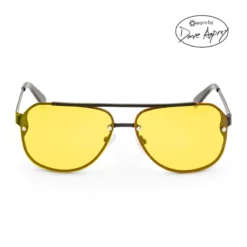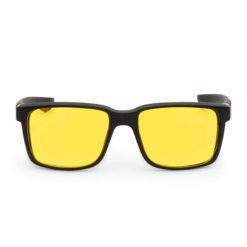Blue Light Blocking Glasses, Health & Wellness
UV Protection and Sunglasses: What You Need To Know

Article at a Glance:
- Ultraviolet (UV) light is electromagnetic radiation that is invisible, and yet it can cause a lot of damage to your eyes.
- The most important types of UV rays to block when exposed to sunlight outdoors include UV-A and UV-B. You want to block as close to 100% as possible.
- UV rays aren’t just harmful during the summer months; they are arguably even more harmful during the winter when sun reflects off of snow.
- Sunglasses can help protect your eyes from various different environmental elements, provide healing, and make it safe to drive.
Sunglasses are a great fashion accessory, but their most important job is to protect your eyes from the sun’s ultraviolet (UV) rays.
What is UV Light?
Ultraviolet (UV) light is electromagnetic radiation that is invisible to the human eye. Its name is derived from the spectrum of electromagnetic waves with frequencies higher than those that humans identify as the color violet. The sun emits ultraviolet radiation in the UVA, UVB, and UVC bands. The Earth’s ozone layer blocks 97-99% of this UV radiation from penetrating through the atmosphere, and UVC rays rarely reach the Earth. UV rays are also emitted through other sources, such as welding machines, indoor tanning beds, and lasers.
Effects on the Eyes
UV light is absorbed by molecules that are present in the eye cells and tissues. If too much UV light is absorbed, eye structures – such as the cornea, the lens, and the retina – can be damaged.
High intensities of UVB light are hazardous to the eyes. Exposure of insufficiently protected eyes to ultraviolet rays can cause Photokeratitis or ultraviolet keratitis, a painful condition of the eye. This is similar to a sunburn of the cornea/conjunctiva and is not usually noticed until several hours after exposure. Photokeratitis may be painful and include symptoms such as red eyes, a foreign body sensation or gritty feeling in the eyes, extreme sensitivity to light, and excessive tearing.
Long-term exposure to UV rays can lead to serious diseases of the eye, including damage to the retina, pterygium (a growth that invades the corner of the eyes), and pinguecula (a yellowish, slightly raised lesion that forms on the surface tissue of the white part of your eye). The longer the eyes are exposed to solar radiation, the greater the risk of developing conditions such as cataracts or macular degeneration later in life.
Prevent Sun Related Health Problems
Eyes are very sensitive. Prolonged exposure to the sun can lead to a variety of ailments. Some are simply painful or irritating while others can be very serious. Remembering to wear a pair of high-quality sunglasses can help to keep you safe from the sun’s damaging rays.
When purchasing sunglasses, look for eyewear that blocks 99 to 100 percent of both UVA and UVB light. This includes those labeled as “UV400,” which blocks all light rays with wavelengths up to 400 nanometers, so you can keep your vision sharp and eyes healthy. Keep in mind that darker lenses do not necessarily provide more protection from harmful UV rays. You may want to consider wraparound sunglasses to prevent harmful UV rays from entering around the frame. (A wide-brimmed hat offers great additional protection as well!)
Additional options for sunglasses include polarized lenses and anti-reflective coatings which cut reflected glare. Polarized lenses in particular are popular with those who play water and snow sports. Anti-reflecting coatings reduce glare caused by light reflecting off the back surface of your sunglass lenses.

Skin Cancer
The skin around your eyes, including your eyelids is very sensitive to sunlight. In fact, nearly 10% of skin cancers are found near the eyes. Wearing UV-protective wraparound sunglasses or those with large lenses can not only protect your eyes, but they will protect your skin, too. Sunglasses also prevent squinting, which produces wrinkles!
 Cataracts & Glaucoma
Cataracts & Glaucoma
Cataracts are cloudy areas on the eye’s lens. According to the Glaucoma Research Foundation, prolonged and long-term exposure to the sun’s UV rays contribute to cataracts. UV exposure may also worsen the symptoms of Glaucoma, another serious eye condition that can result in blindness. Sunglasses with complete UV protection can help reduce your risk of cataracts or complications from glaucoma.
 Macular Degeneration
Macular Degeneration
Macular Degeneration is a condition where part of the retina, called the macula, deteriorates, causing impaired vision and in many cases, eventual blindness. Certain types of UV radiation can speed up this process, so wearing sunglasses may help protect you.
Sunglasses also provide blue-light protection. Long-term exposure to the blue and violet portion of the solar spectrum has been implicated as a risk factor for macular degeneration, which can lead to blindness.
 Pterygium
Pterygium
Also known as surfer’s eye, pterygium is a growth on the eyeball itself. It’s usually not serious, but it can be painful and annoying. Eye drops, steroids and surgery (in advanced cases) are the most common treatments. But the best treatment, of course, is prevention. Doctors recommend wraparound sunglasses with UV protection, especially on cloudy days when the sun is not visible, but its UV rays can still damage the eyes.
Protection from the Elements
 Snow: What many people don’t realize is that damaging UV rays are much more dangerous in winter than in summer. In summer, green surroundings only reflect about 6% of light. For snow, though, that figure is actually 80%.
Snow: What many people don’t realize is that damaging UV rays are much more dangerous in winter than in summer. In summer, green surroundings only reflect about 6% of light. For snow, though, that figure is actually 80%.
Spending time in the snow can cause a condition known as snow blindness, where glare from the sun actually burns the cornea. If you’re skiing, climbing snowy mountains or spending time in the snow (at any time of year), wear sunglasses! Make sure they cover and protect the bottom of your eyes, because of the reflective nature of the snow. Wearing sunglasses will avert snow blindness and keep you on the slopes longer!

Pollen: Wearing sunglasses physically blocks out pollen. Sunglasses help by decreasing the amount of air that circulates over your eye, which helps keep allergens from directly touching them. Since light exposure can increase allergy symptoms in your eyes, UV-blocking sunglasses may even help control symptoms. Your eyes and nose are directly connected, so blocking your eyes will help keep your nose clear as well!

Sand: Getting sand in your eyes can be very painful and dangerous. Tiny grains of sand can scratch your eye and can cause permanent damage. Sunglasses that fully cover your eyes are a great way to keep sand out.

Wind & Dust: Spending a lot of time in windy, dusty areas can irritate and damage your eyes. Again, the best way to protect yourself is by wearing sunglasses that keep your eyes safe from the elements.
 Promote Healing & Recovery
Promote Healing & Recovery
If you have had LASIK or PRK surgery to correct your vision, you should be extra sure to wear sunglasses. Your doctor may recommend a pair for you to wear immediately after the procedure but continuing to wear sunglasses can protect your eyes as they heal and as you adjust to your new vision.
Corrective surgeries are commonplace, but with improper post-surgical care, there can be complications. Avoid them by following your doctor’s orders and wearing sunglasses to protect your newly restored vision.

You’ll See More & Enjoy the Outdoors More
As important as protecting your health is, there are more good reasons to wear protective eyewear more often. While spending time outdoors, you will really benefit from wearing your sunglasses because they minimize glare and allow you to take in all the magnificent vistas and colors.
If you enjoy fishing or spending time on the water, with the right sunglasses, you will be able to see through the glare on top of the water and notice fish and aquatic life that you only hoped was there!

Fewer Headaches & Migraines: You’ll be More Comfortable
Bright sunlight can be a trigger for migraines and bad headaches. Wearing sunglasses can help reduce both the frequency and intensity of these painful occurrences. And even if you are not a headache or migraine sufferer, wearing sunglasses when out in the sun can help reduce eyestrain and fatigue, meaning that you will just be more comfortable and enjoy your time outdoors even more.
 Safer Driving
Safer Driving
When driving in bright sunlight, sunglasses can help you see better and drive more comfortably. Just make sure you don’t wear sunglasses when driving at night – that is NOT safe, and it is NOT recommended.
A final look in the rearview mirror
Ordinary, untreated eyeglasses give some protection against UV light. Plastic lenses provide a better amount of UV coverage than glass. Some plastic lens materials, such as polycarbonate, inherently block most UV light, and photochromic lenses provide full UV protection. A UV coating can be applied to most eyeglass lenses without changing the appearance of the lenses, which will give better protection. But even a treatment that completely blocks UV light will not protect the eye from light that arrives around the lens. If you spend a lot of time outdoors in bright sunlight, wrap-around frames can provide additional protection from harmful solar radiation.
Some contact lenses have UV protection, but you should still wear sunglasses because UV rays may affect the eye tissue that is not covered by the contact lenses.
Sunglasses That we Think You’ll Love!



